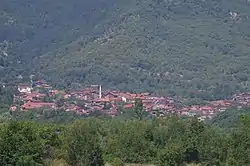Podgorci, Struga
Podgorci (Macedonian: Подгорци, Albanian: Podgorcë) is a small village in the municipality of Struga, North Macedonia.[1]
Podgorci Podgorcë | |
|---|---|
Village | |
| Подгорци | |
 Panoramic view of the village | |
 Podgorci Podgorcë Location within North Macedonia | |
| Coordinates: 41°15′53″N 20°35′44″E | |
| Country | |
| Region | |
| Municipality | |
| Elevation | 825 m (2,707 ft) |
| Population (2019) | |
| • = | 1,026 |
| Time zone | UTC+1 (CET) |
| • Summer (DST) | UTC+2 (CEST) |
| Area code(s) | +38946 . |
| Car plates | SU |
History
In 1900, Vasil Kanchov gathered and compiled statistics on demographics in the area and reported that the village of Podgorci was inhabited by about 600 Bulgarian Christians and 550 Bulgarian Muslims.[2]
The "La Macédoine et sa Population Chrétienne" survey by Dimitar Mishev (D. Brankov) concluded that the Christian part of the local population in 1905 was composed of 288 Exarchist Bulgarians and 352 Patriarchist Bulgarians. There were Bulgarian and Serbian schools in the beginning of 20th century[3]
Demographics
Podgorci has been inhabited by Orthodox Christian Macedonians and a Macedonian Muslim (Torbeš) population.[4][5][6]
Languages
Languages spoken among the population of Podgorci:[7]
- Macedonian 1995
- Albanian 89
- Turkish 22
- Bosnian 1
- Rest 53
References
- "Podgorci Struga, Macedonia - Podgorci Struga | Podgorci map". makedonija.name. Retrieved 2016-03-21.
- Vasil Kanchov (1901). Кънчов, Васил. Македония. Етнография и статистика, София, 1900, стр. 254. (Macedonia: Ethnography and Statistics, p. 254. Accessed 30 January 2018 (in Bulgarian)
- D.M.Brancoff. "La Macédoine et sa Population Chrétienne". Paris, 1905, pp. 164-165. Accessed 30 January 2018 (in French)
- Hendriks, P. (1976). The Radožda-Vevčani Dialect of Macedonian: Structure, Texts, Lexicon. John Benjamins Publishing. p. 5. ISBN 9789031600892.
- Vidoeski, Božidar (1998). Dijalektite na makedonskiot jazik. Vol. 1. Makedonska akademija na naukite i umetnostite. ISBN 9789989649509. p. 333. "Исламизираните Македонци во струшките села Јабланица, Боро(в)ец, Октиси, Подгорци и Лабуништа живеат заедно со православното население.".
- Етнография на Македония. Извори и материали в два тома, т. 2, София 1992, с. 74. Рапорт на Яким Деребанов - "Селото е смесено от българе-християни и бълг[ари-мухамедани]".
- Macedonian Census (2002), Book 5 - Total population according to the Ethnic Affiliation, Mother Tongue and Religion, The State Statistical Office, Skopje, 2002, pp. 131, 268